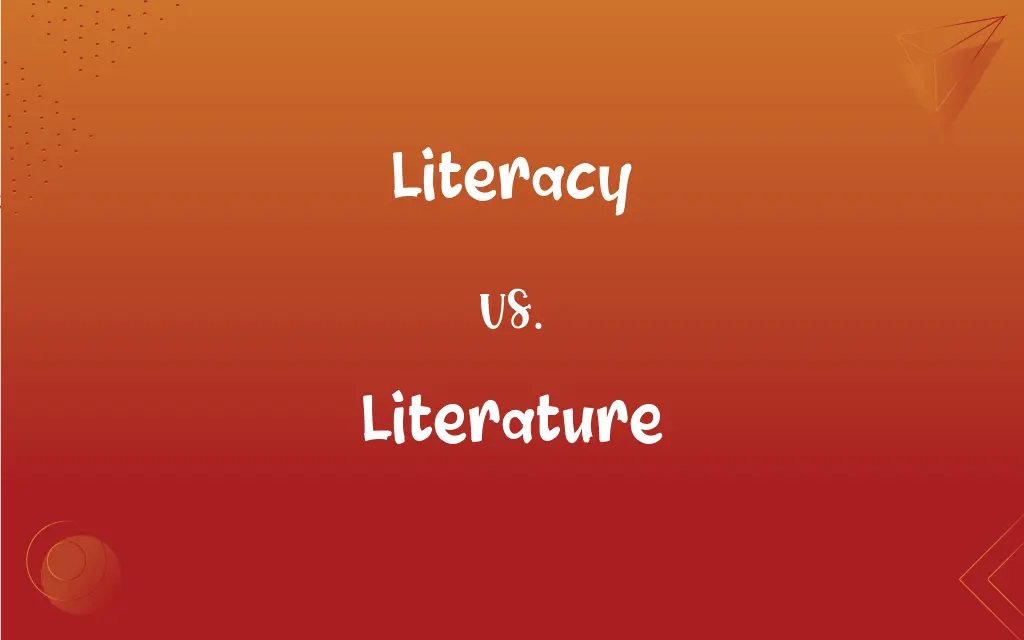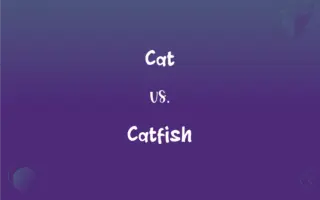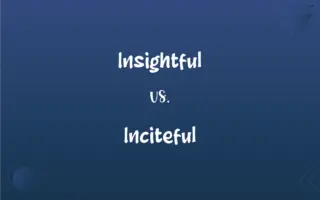Literacy vs. Literature: What's the Difference?
Edited by Harlon Moss || By Janet White || Updated on October 19, 2023
"Literacy is the ability to read and write, while Literature refers to written works, especially those considered of superior or lasting artistic merit."

Key Differences
Literacy, a fundamental skill, encompasses the capabilities required for reading and writing. Literature, on the other hand, represents the body of written works, spanning various genres and cultures, often recognized for their artistic value or profound insights.
The development of Literacy is crucial in educational contexts, enabling individuals to understand and interpret written information. Literature serves as both a vehicle for and a beneficiary of Literacy, often being the medium through which individuals practice and enrich their reading and writing skills.
Literacy, when nurtured, provides the foundation for individuals to explore a wide array of informational and creative materials. Literature, conversely, offers an endless landscape for those with Literacy skills to traverse, presenting everything from historical texts and legal documents to novels and poetry.
Literacy is not only about the mechanics of reading and writing but also involves a comprehensive understanding and critical analysis of texts. Literature, in its richness, provides a diverse platform for this critical engagement, challenging readers to delve into complex themes and stylistic devices.
In a broader sense, Literacy empowers societies by promoting informed citizenship and personal growth. Literature, reflecting the tapestry of human experience, contributes to this empowerment by providing insight, preserving histories and cultures, and promoting empathy and understanding.
ADVERTISEMENT
Comparison Chart
Definition
Ability to read and write
Body of written works
Role
Fundamental skill
Artistic and cultural reflection
Purpose
Communication, comprehension
Expression, preservation, storytelling
Application
Education, daily life
Arts, academia
Development
Learned
Created
ADVERTISEMENT
Literacy and Literature Definitions
Literacy
Familiarity with literature and other written works.
Classical literacy is important for students of literature.
Literature
Texts that form and shape ideas, and reflect historical and cultural contexts.
Her analysis revealed the revolutionary ideas hidden in the literature of the time.
Literacy
The state of being literate, especially the ability to read and write text fluently.
The literacy campaign significantly improved reading abilities in the community.
Literature
Printed materials used to provide information or advertising.
The company's marketing literature was quite persuasive.
Literacy
Competence or knowledge in a specified area.
Her computer literacy was evident from her fast coding skills.
Literature
The body of artistic writings of a country or period that are characterized by beauty of expression.
Russian literature of the 19th century is renowned for its depth and complexity.
Literacy
A measure of the ability to understand and use information from written texts.
Literacy rates are a significant indicator of a country's educational progress.
Literature
The body of written works of a language, period, or culture.
Literacy
The condition or quality of being literate, especially the ability to read and write. See Usage Note at literate.
Literature
Imaginative or creative writing, especially of recognized artistic value
"Literature must be an analysis of experience and a synthesis of the findings into a unity" (Rebecca West).
Literacy
The condition or quality of being knowledgeable in a particular subject or field
Cultural literacy.
Biblical literacy.
Literature
The art or occupation of a literary writer.
Literacy
The ability to read and write.
Literature
The body of written work produced by scholars or researchers in a given field
Medical literature.
Literacy
The ability to understand and evaluate something.
Computer literacy; media literacy
Literature
Printed material
Collected all the available literature on the subject.
Literacy
State of being literate.
Literature
(Music) All the compositions of a certain kind or for a specific instrument or ensemble
The symphonic literature.
Literacy
The ability to read and write
Literature
The body of all written works.
Literature
The collected creative writing of a nation, people, group, or culture.
Literature
(usually preceded by the) All the papers, treatises, etc. published in academic journals on a particular subject.
Literature
Written fiction of a high standard.
However, even “literary” science fiction rarely qualifies as literature, because it treats characters as sets of traits rather than as fully realized human beings with unique life stories. —Adam Cadre, 2008
Literature
Learning; acquaintance with letters or books.
Literature
The collective body of literary productions, embracing the entire results of knowledge and fancy preserved in writing; also, the whole body of literary productions or writings upon a given subject, or in reference to a particular science or branch of knowledge, or of a given country or period; as, the literature of Biblical criticism; the literature of chemistry.
Literature
The class of writings distinguished for beauty of style or expression, as poetry, essays, or history, in distinction from scientific treatises and works which contain positive knowledge; belles-lettres.
Literature
The occupation, profession, or business of doing literary work.
The origin of all positive science and philosophy, as well as of all literature and art, in the forms in which they exist in civilized Europe, must be traced to the Greeks.
Learning thy talent is, but mine is sense.
Some gentlemen, abounding in their university erudition, fill their sermons with philosophical terms.
Literature
Creative writing of recognized artistic value
Literature
The humanistic study of a body of literature;
He took a course in Russian lit
Literature
Published writings in a particular style on a particular subject;
The technical literature
One aspect of Waterloo has not yet been treated in the literature
Literature
The profession or art of a writer;
Her place in literature is secure
Literature
Written works, especially those considered of superior or lasting artistic merit.
She spent the weekend immersed in classic literature.
Literature
Books and writings published on a particular subject.
The literature on climate change is extensive and diverse.
FAQs
Can you be literate in areas other than reading?
Yes, for example, computer literacy refers to proficiency with computers.
Are magazines and newspapers considered Literature?
They're generally not classified as "literature" but are written works nonetheless.
Is Literacy just about reading and writing?
No, it also involves understanding, interpreting, and critically analyzing texts.
Does Literature always have to be fictional?
No, it can also encompass non-fictional works with artistic, historical, or intellectual value.
How does Literacy affect a person's life?
Literacy is crucial for communication, education, and access to information.
How is digital Literacy different from traditional Literacy?
It involves understanding and using digital platforms and technology effectively.
Can films and music be considered Literature?
Traditionally, no, but they can be literary in nature through their narratives or lyrics.
Can Literacy improve job prospects?
Absolutely, as it's a fundamental skill for communication and understanding in most jobs.
Who decides what works are included in the canon of Literature?
Often academics, based on historical significance, cultural impact, and artistic merit.
Can Literature be factual?
Yes, it can include factual writings like essays, histories, biographies, etc.
What makes something a work of Literature?
Typically, its artistic merit, use of language, and emotional or intellectual depth.
At what age should Literacy development begin?
Early childhood, as foundational skills start developing then.
What's the relationship between Literacy and poverty?
Higher literacy rates can contribute to economic growth and reduce poverty.
How broad is the term Literature?
Very broad, encompassing a variety of genres, periods, and forms of written works.
How does Literature reflect culture?
It captures and expresses the values, beliefs, and experiences of a society.
Why study Literature?
It enhances empathy, critical thinking, and understanding of human experience and culture.
Why is Literacy important in education?
It's foundational for learning, critical thinking, and accessing educational materials.
Does Literacy affect health?
Yes, health literacy is crucial for understanding medical information and making health decisions.
How is Literacy measured?
Through various assessments of reading comprehension, writing skills, and ability to interpret texts.
What genres does Literature include?
Numerous, including poetry, drama, fiction, non-fiction, and more.
About Author
Written by
Janet WhiteJanet White has been an esteemed writer and blogger for Difference Wiki. Holding a Master's degree in Science and Medical Journalism from the prestigious Boston University, she has consistently demonstrated her expertise and passion for her field. When she's not immersed in her work, Janet relishes her time exercising, delving into a good book, and cherishing moments with friends and family.
Edited by
Harlon MossHarlon is a seasoned quality moderator and accomplished content writer for Difference Wiki. An alumnus of the prestigious University of California, he earned his degree in Computer Science. Leveraging his academic background, Harlon brings a meticulous and informed perspective to his work, ensuring content accuracy and excellence.































































